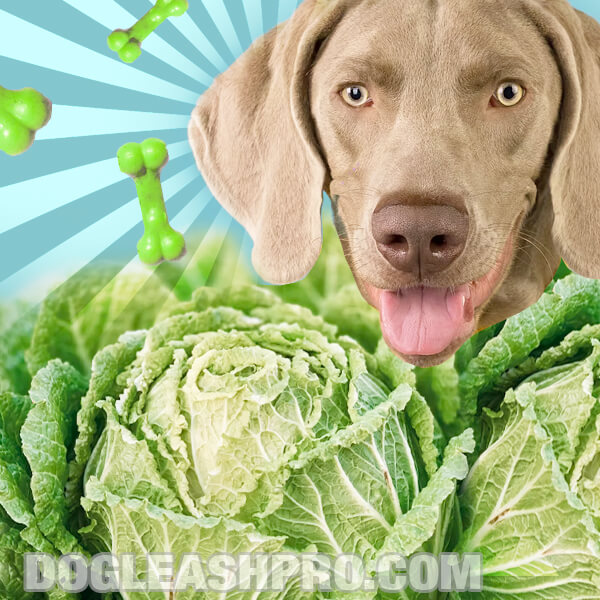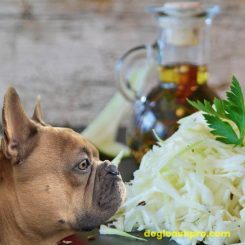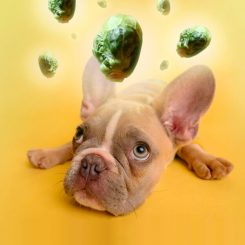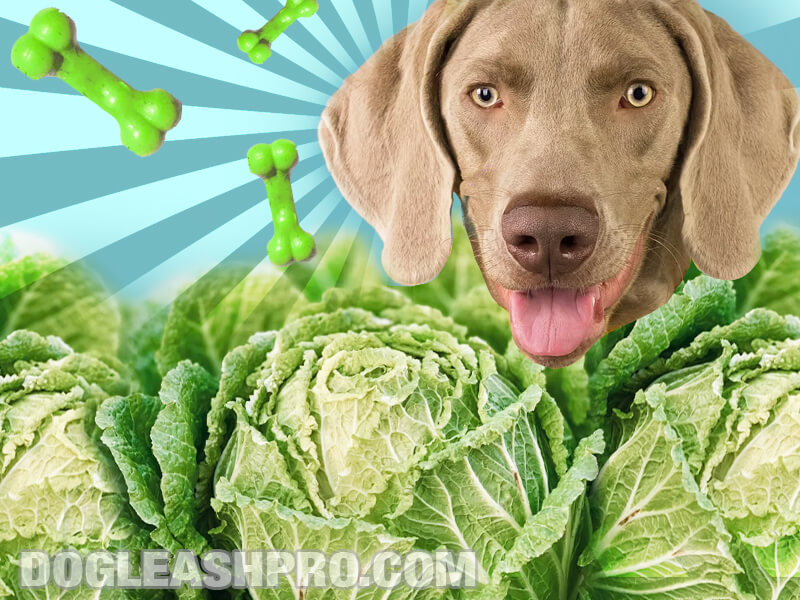
Cabbage is a popular ingredient used in many dishes around the world. It’s just as delicious as crunchy coleslaw and packed full of nutrients and vitamins. While you’re enjoying your Cabbage dish, you’re probably wondering, “can my dog eat Cabbage?” or “Can I feed my dog Cabbage?” Here’s the short answer first.
Can dogs eat Cabbage? Yes, dogs can eat Cabbage in moderation. Cabbage is great for dogs since it is packed full of antioxidants, fiber, vitamins, and minerals. These properties help to support a strong immune system and proper digestion in dogs as well as promote healthy skin and fight diseases. However, moderation is key as too much Cabbage may affect your dogs’ thyroid gland and make them very gassy.
Table of Contents
Can dogs have Cabbage?
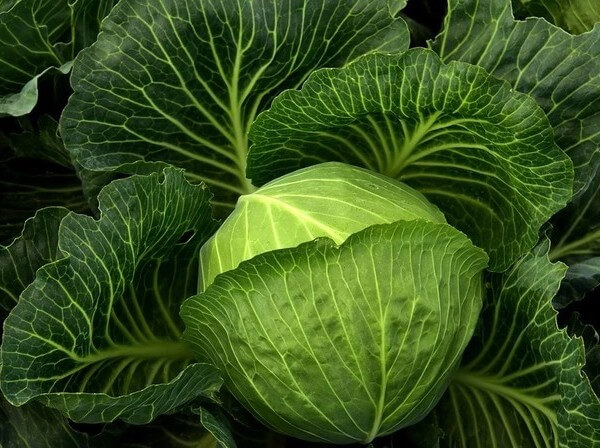
Yes, dogs can have Cabbage in moderation. Cabbage comes in an array of colors: green, white, red, purple, and pale green. But are all of them safe for dogs to eat?
If you’re wondering, “can dogs have Cabbage to eat?” and which one is safe for my furry family members, you’ll want to keep reading.
We’ll go over the different types of Cabbage next and discuss whether they are safe for doggy consumption.
Cabbage and dogs
Cabbage is a popular leafy vegetable enjoyed by many around the world. It can be added to soups, stews, salads, and many types of dishes. Cabbage can be eaten raw, cooked, boiled, braised, sauteed, or fried. There are many ways to enjoy this cruciferous vegetable.
There are four types of Cabbage. Green, red or purple, napa, and savoy. You can find all of them at your local grocery store. Let’s go over whether these different types of Cabbage are safe for our four-legged friends.
Can dogs eat green Cabbage?
Yes, dogs can eat green Cabbage in moderation. In fact, green Cabbage is packed full of vitamin C and K. If you’re looking for a healthy source of fiber goodness for your K9 friends, try giving them some green Cabbage.
Both vitamin C and K provide your dogs with health benefits. Let’s go over how each of these vitamins helps your furry pals.
Green Cabbage is loaded with both vitamin C and K which are beneficial to dogs
Vitamin C in Cabbage is an essential antioxidant that provides the following health benefits to dogs:
- Reduce inflammation.
- Fight harmful free radicals in your dog’s body.
- Promote healthy aging.
- Improve your dog’s immune system.
- Increase energy level in dogs.
- Provide relief to dogs suffering from urinary tract infections or UTI.
Vitamin K in Cabbage is a nutrient that helps blood to clot in dogs
Our furry friends need vitamin K so that their blood can clot and this allows their bodies to recover successfully from injuries such as from a wound or cut.
What about the Cabbage leaves? Can dogs eat green Cabbage leaves?
Yes, dogs can eat green Cabbage leaves. The Cabbage leaves also contain vitamins and nutrients that are healthy for dogs.
So, can dogs have green Cabbage?
As we can see, dogs can have green Cabbage in moderation. Green Cabbage is healthy for your furry family members and it is a great idea to add a small amount of Green Cabbage into their diet or give them a small amount of green Cabbage as a treat.
Now that we know dogs can eat green Cabbage and green Cabbage leaves, let’s find out whether dogs can eat raw green Cabbage next.
Can dogs eat raw green Cabbage?
You’ll be glad to know that dogs can eat raw green Cabbage in moderation. When the green Cabbage is raw, it does has a peppery flavor and rubbery texture. Some dogs may not like this and will naturally avoid raw green Cabbage.
However, if your pooch enjoys raw green Cabbage, make sure to chop it up into small pieces and you can add it to their regular diet.
Be careful with how much raw green Cabbage you’re feeding your pooch. Raw green Cabbage contains thiocyanate, a natural compound that can negatively affect your pup’s thyroid gland and cause hypothyroidism so moderation is key.
Another common type of Cabbage is red Cabbage. Can dog eat red Cabbage? We will answer this next.
Can dogs eat red Cabbage?
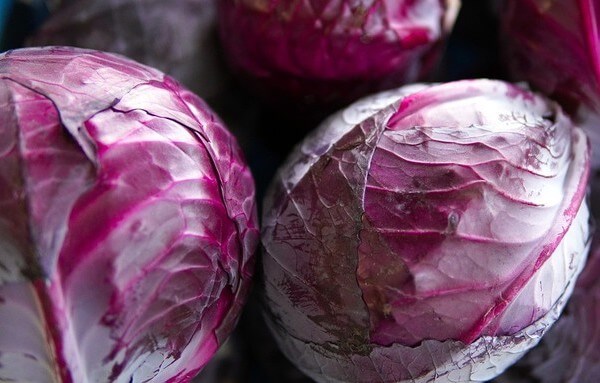
Yes, dogs can eat red Cabbage in moderation. Red Cabbage is oftentimes called purple Cabbage because the color of the Cabbage looks red and purple at the same time. So, can dogs eat purple Cabbage? Absolutely! Dogs can definitely eat purple Cabbage.
Like green Cabbage, red Cabbage is packed full of antioxidants and contains cancer-fighting properties.
Red Cabbage, like other types of Cabbage, contains phytonutrients. Phytonutrients are antioxidant compounds that are very powerful. In general, antioxidants help to fight free radicals in your dog’s blood, and this aid in the prevention of cancer and diseases.
As a result, your K9 family members will naturally have strong immune systems and they’ll be less likely to develop health problems such as heart disease.
Feeding your pooch a small amount of Red Cabbage also promotes a healthy digestive system due to its high fiber content.
But what about raw red Cabbage? Can my dog eat red Cabbage? Here’s the answer.
Can dogs eat raw red Cabbage?
Yes, dogs can eat raw red Cabbage in moderation. Remember though that raw Cabbage, no matter if it is green, red, purple, or white contains a natural compound called thiocyanate which can suppress your dog’s thyroid gland.
Eating too much raw red Cabbage regularly may cause hypothyroidism so it’s best to feed your precious pooch a small amount of raw red Cabbage occasionally.
Is red Cabbage good for dogs?
Yes, red Cabbage is good for dogs. In fact, red Cabbage is chocked full of fiber and vitamins. Specifically, red Cabbage contains vitamins C and K. See above to learn how these vitamins help benefit your dog’s health.
If your dog is feeling under the weather or has digestive system issues like constipation or diarrhea, giving him or her a small amount of red Cabbage will help.
If you’re wondering, “Is purple Cabbage good for dogs?” you’ll be glad to know that purple Cabbage is also good for dogs too since red Cabbage is purple Cabbage.
Can dogs eat raw white Cabbage?
Yes, dogs can eat raw white Cabbage in moderation. White Cabbage provides the same nutrients and health benefits to our furry family members as green and red or purple Cabbage.
Again, it’s best to feed your precious pooch raw white Cabbage in moderation as too much of it can suppress their thyroid gland since raw Cabbage, no matter which type contains thiocyanate.
Fun Fact: When dogs eat a lot of Cabbage, they can become very gassy. Eating too much Brussel Sprouts can also cause gas in dogs as well. Can dogs eat this cruciferous vegetable? Check out Can Dogs Eat Brussel Sprouts? to find out!
Is Cabbage good for dogs?
As we can see, Cabbage is good for dogs when our K9 friends consume it in moderation. As mentioned above, Cabbage provides your four-legged friends with an array of health benefits. Not only does Cabbage contain vitamins C and K, but it also contains vitamins B1 and B6.
Here’s how vitamin B1 and B6 help our furry friends.
Vitamin B1 in Cabbage promotes healthy growth in dogs
Vitamin B1 is also known as thiamine and it is one of many essential vitamins for our dogs. That’s because our furry babies need vitamin B1 to maintain the healthy growth of both their brain and body and to function properly.
In fact, your four-legged friends’ organs and brain need Vitamin B1 or thiamine in their daily diet to break down carbohydrates and maintain healthy metabolism so that they can have the energy to exercise and play.
Additionally, vitamin B1 also provides your dog with good eyesight.
Vitamin B6 in Cabbage is responsible for a healthy heart and body in dogs
Vitamin B6 is also known as pyridoxine which is responsible for supporting amino acid metabolism in dogs.
Vitamin B6 aid in protein synthesis and fat absorption which helps puppies grow properly and is responsible for keeping them feeling happy and healthy. Also, vitamin B6 helps to maintain a balance of potassium and sodium in your furry friend’s body so that he has a well-toned body.
Additionally, you can thank pyridoxine or vitamin B6 for your dog’s healthy red blood cell production and proper brain function. Not only is vitamin B6 linked to heart health in canines, but it’s also responsible for proper bladder health in dogs too.
Fiber in Cabbage helps to maintain a healthy gut in dogs
In addition, cabbage is a rich source of healthy fiber. Our K9 pals need fiber to regulate their bowel movements and have a healthy balance in the gut and colon.
If your pooch is suffering from constipation or diarrhea, adding a moderate amount of Cabbage to their diet can do wonders for him. That’s because fiber helps to produce formed and firm stools by absorbing excess water and increasing bulk.
As we can see, a moderate amount of Cabbage can promote a healthy digestive system in dogs.
The health benefits from consuming Cabbage are not over. Cabbage also contains essential minerals such as potassium, copper, and manganese. Here’s how these minerals help our four-legged friends.
Potassium in Cabbage provides proper heart, muscles, and nerves functions in dogs
Our canine friends need potassium in their daily diet in order to have proper heart, muscles, and nerves function.
That’s because potassium is an electrolyte so when it interacts with water, it is highly reactive and will dissolve and produce positively charged ions. This allows it to send electrical charges to your dog’s muscles and is responsible for muscle contraction, sending nerve signals, and regulating fluid throughout your dog’s body.
Dogs that do not have enough potassium may become tired or have a loss of appetite. They may lose weight and muscle mass.
However, too much potassium can also be harmful to dogs. Dogs with too much potassium may collapse, experience weakness, and arrhythmias.
For these reasons, only offer your pooch a moderate amount of Cabbage.
Fun Fact: Beets are another powerful vegetable that is packed full of potassium, fiber, and manganese. But is this vegetable safe for doggy consumption? Check out Can Dogs Eat Beets? to find out!
Copper in Cabbage is an essential mineral that dogs need
Our furry friends need copper because it helps their bodies absorb iron which promotes healthy red blood cell function. Copper also ensures that their bodies have proper bone formation as well as healthy myelin, collagen, and connective tissue.
For this reason, it’s a great idea to give your canine friends a moderate amount of Cabbage.
Manganese in Cabbage is vital to metabolizing protein and carbs in dogs
Manganese is another essential mineral that our dogs need. Our furry friends’ bodies need this vital micromineral in order to create energy, make good fatty acids, and metabolize carbs and protein.
The enzymes in your dog’s body need manganese in order to support healthy cartilage in joints and bones.
So, can dogs eat Cabbage?
We can see that Cabbage is a great addition to your dog’s diet and consuming a moderate amount of Cabbage occasionally, whether raw or cooked, provides many health benefits to our four-legged friends.
While raw Cabbage is safe for doggy consumption, it’s best to feed your pooch cooked Cabbage since it is easier for him or her to digest.
If this is your pup’s first time having Cabbage, remember to introduce this vegetable in small amounts and see if he likes it. Some dogs don’t like the taste of vegetables or simply don’t like vegetables at all.
DISCLAIMER: THIS WEBSITE DOES NOT PROVIDE MEDICAL ADVICE
The information, including but not limited to, text, graphics, images and other material contained on this website are for informational purposes only. No material on this site is intended to be a substitute for professional veterinary advice, diagnosis, or treatment. Always seek the advice of your veterinarian or other qualified health care provider with any questions you may have regarding dietary needs.
Resources:
https://en.wikipedia.org/wiki/Cabbage
https://pubmed.ncbi.nlm.nih.gov/7440313

With over five years of specialized experience as an animal writer, my expertise lies in dog nutrition, health, behavior, grooming, and training. I am dedicated to delivering helpful and informative content that caters to the well-being of our furry friends. My primary goal is to empower pet owners with knowledge and ensure our canine companions thrive in health and happiness. In my free time, I love volunteering at local dog rescue centers.
